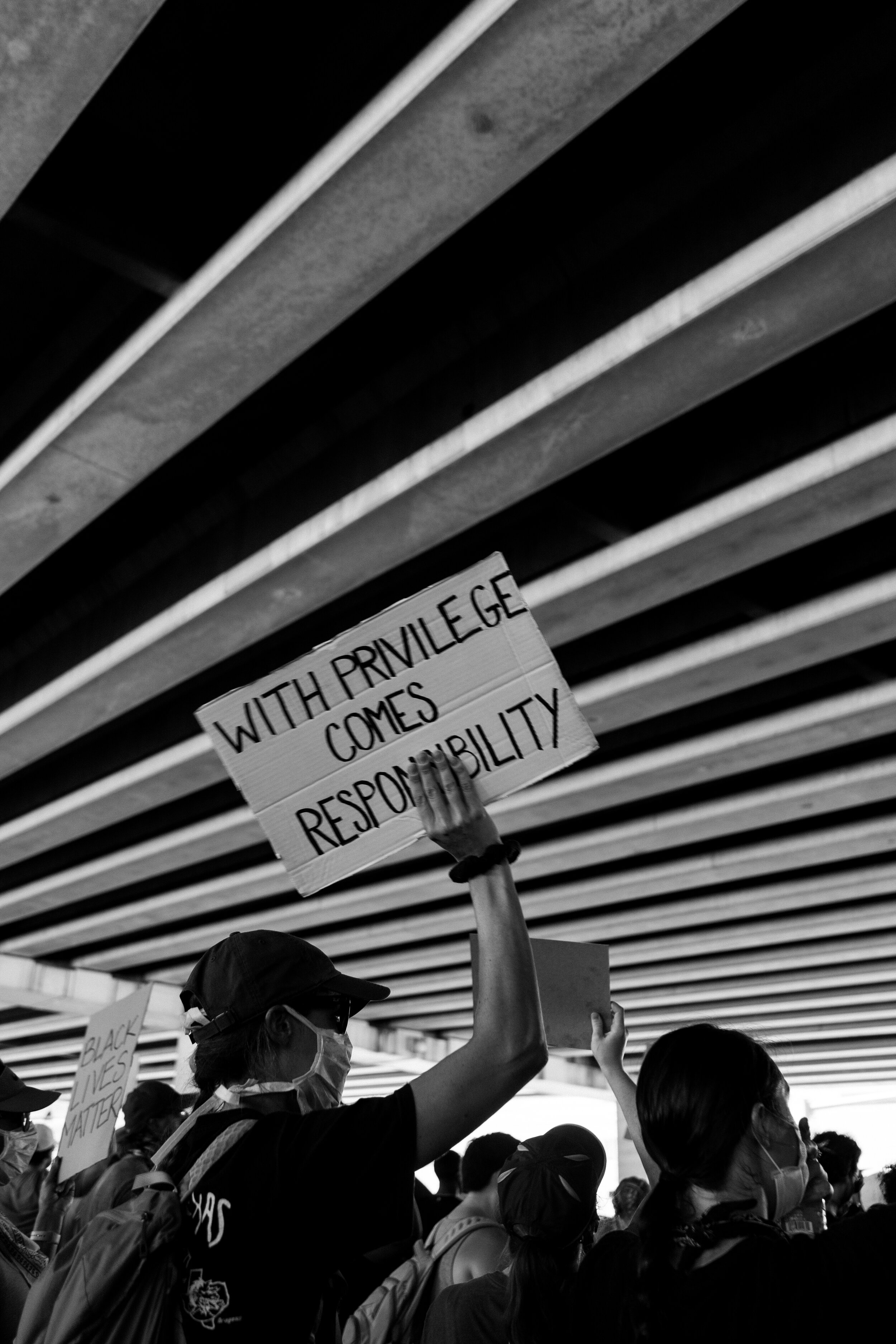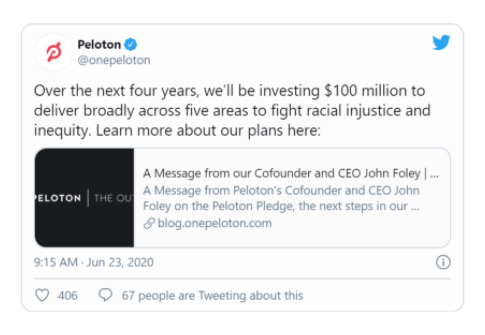How Brands Promote Social Responsibility
When it comes to sensitive topics, brands need to focus on saying the right words at the right time. From political campaigns to product campaigns, advertising regularly influences how people perceive the world — and how they see, think, act, and behave.
Businesses have a responsibility to make social and political statements that express their values and commitments. And not speaking up is not an option. When brands stay silent on an issue the consumer feels the brand has an obligation to address, consumers are likely not to buy from them.
Moreover, consumers — especially the youth market and millennials — have a strong affinity for brands that go beyond the profit motive and show social responsibility. Customers want to see their favorite companies declare their politics boldly.
In response to new consumer buying habits, brands can no longer stand apart from social movements and activism. Instead, they have to be the change through rebranding and intentional efforts, or they risk serious criticism.
In this article, we look at how brands have involved themselves in social movements and their effects on consumer perception.
Why People Look to Brands on Social Issues
According to Edelman’s Earned Brand Study, 57 percent of consumers will buy or boycott a brand because of its position on an issue. On top of that, about 65 percent of that group won’t buy a brand when it stays silent on an issue the consumer feels the brand has an obligation to address.
One of the first brands to move into a debate involving social issues was athletic and footwear brand, Nike.
Nike’s much-discussed commercial in 2018 featured former NFL quarterback, Colin Kaepernick, in its 30th anniversary “Just Do It” campaign. The campaign’s slogan, “Believe in something. Even if it means sacrificing everything” was featured in the ad. Critics worried about the conflation of “political action with consumerism,” and they weren’t wrong. Nike shares took a hit, the hashtag #NikeBoycott was trending on Twitter, and President Trump condemned the ad on Twitter.
However, in the days and weeks after the commercial’s release, Nike experienced a surge in sales. The brand even won a Creative Arts Emmy for best commercial in 2019. In fact, this was the first time Nike won an award since 2002.
The commercial was narrated by Kaepernick, who helped to launch a movement in 2016 to take a knee during the national anthem before NFL games. It also featured Serena Williams, Lebron James, and other prominent African American athletes.
Fast forward to modern day, you’ll see many more corporations taking a stand. The emergence of the coronavirus pandemic has forced brands to rethink their advertising approach and become more empathetic and socially aware.
According to Mike Middleton, who’s headed local marketing operations for the likes of KFC and Mondeléz International, the crisis has highlighted the impact of human behavior on the planet. This means consumers are hyper aware of which brands are doing good and which ones are falling behind, which strongly influences their purchasing decisions.
In 2020 alone, brands and marketers have already confronted many social challenges:
Adapting to disruptions caused by COVID-19, stay-at-home measures, and heightened anxiety from consumers
A new understanding of social movements fueled by support for #BlackLivesMatter. The murder of George Floyd has sparked a surge of protests all over the world. As citizens demand police reform and an end to racial injustice, brands have begun speaking out about their support for Black communities and racial injustice. Almost three-quarters (71%) of U.S. adults said brands have a role in responding to the issues of racial injustice and police brutality
Here are how some brands have pledged their support in response to the Black Lives Matter movement:
Nike
In response to George Floyd’s death, Nike released an ad that addressed racism head-on. Following a week of protests and unrest in Minneapolis, the sportswear giant released a 60-second spot on its digital channels. Nike tells consumers in stark white text over a black background, “For once, don’t do it.”
The videos proceeds to list out many “dont’s.” “Don’t make any excuses. Don’t pretend there’s not a problem in America. Don’t turn your back on racism. Don’t accept innocent lives being taken from us.”
Not only was this effort a clever twist on the brand’s long-used tagline “Just Do It”, it also calls attention to the many things Americans shouldn’t do in response to the protests.
Peloton
Peloton, the in-home fitness company, pledged half a million dollars to the NAACP legal defense fund. They have encouraged their members to take fitness classes with black instructors, as well as educate themselves and donate money.
Ben & Jerry’s
Social justice issues have laid the foundation for the Ben and Jerry’s brand for decades. Since George Floyd’s death, the brand has publicly shown its commitment to racial injustice on its social media channels. They also released a statement focused on the dismantling of white supremacy, calling upon the president to denounce white supremacy groups that support him.
More recently, Ben & Jerry’s teamed up with the Who We Are Project to create a new podcast examining the legal discrimination, segregation and state-sanctioned violence Black people in America faced since the end of chattel slavery. The podcast, titled “Who We Are: A Chronicle of Racism In America”, will begin Sept. 15 and run for six episodes
Uber
Uber took quite a different approach than most other brands. The campaign asserts this message: “If you tolerate racism, delete Uber.” Across social media, emails, app notifications, and 13 billboards in major U.S. cities,
Many brands are restructuring their leadership teams as a result of the Black Lives Matter movement, and Pinterest is one of these brands. The brand recently announced a new Global Head of Inclusion and Diversity, and is placing the role under its executive management team for the first time.
Netflix
“To be silent is to be complicit. Black lives matter,” said Netflix on Twitter. The brand’s curation of BLM content, for instance, is a bold statement about its support for the Black Lives Matter movement. The BLM content genre on Netflix contains a “carefully curated list of titles that only begin to tell the complex and layered stories about racial injustice and Blackness in America,” the company said in a tweet.
These examples show that brands can act as allies of social justice movements in subtle but impactful ways. Socially-oriented actions may not lead to profit directly, but are likely to reap positive reactions from the public. Some socially-oriented actions do more than just acknowledge social issues; they advocate for them. To advocate means to actively support a cause. Nike is a great example of a brand that has actively taken a stand on social issues without any self-interest involved.
The Fine Line of Activism
When advertisers tread into strongly emotional territories, like the one surrounding the Black Lives Matter movement, they face potential challenges. Even if their viewers agree with them on their viewpoint, brands need to be wary not to abuse social issues for profit.
Yes, brands have done good, but the resurgence of the Black Lives Matter movement has also brought some overlooked actions to light. Many brands have received public backlash as a result.
For instance, Peloton found itself apologizing for the lack of diversity on its leadership team after pledging $500,000 to the NAACP Legal Defense Fund. In addition, coffee brand Starbucks faced backlash when it was revealed the company wouldn’t be allowing employees to wear Black Lives Matter clothing or accessories. The brand stated its policy prohibiting political attire was necessary to create a safe and welcoming environment for customers. Starbucks eventually revised the policy, allowing baristas to wear Black Lives Matter attire.
Even Nike’s "For Once, Don't Do It" ad, which was seen as empowering by 60% of viewers, saw a higher "exploit" signal than either of its 2018 ads starring Colin Kaepernick. Consumers did not want to take advantage of the situation to sell shoes.
And as mass social justice protests began pushing for change across America, many brands including Ben & Jerry’s, Patagonia, and the North Face pulled their advertising from Facebook. Brands banded together in the Stop Hate for Profit campaign, which is spearheaded by civil rights groups arguing that Facebook is not doing enough to keep hate speech off its platforms.
Can Brand Contribute to Real Change?
What actual good do brand tweets, videos, press releases, and words of support do in the fight against pressing social and political issues?
Certainly, brands standing as allies and speaking up about important issues is a good thing. Brands hold global influence on many levels, so their statements can heavily impact how their employees and consumers act.
But beyond their words, brands need to show how they are investing and impacting their communities. On top of that, some brands’ words carry more weight than others depending on their past deeds. Brands like Ben & Jerry’s and Netflix are appreciated because they show consistency and acknowledgement.
Moreover, the companies that do the most good are those with brand authenticity. It’s easy to dismiss brand actions as a low-cost effort or simply a way to be politically correct. In fact, there’s a term for this act of purely doing good to pay lip service: good-washing.
Good-washing happens when companies take a stand on an issue, but don’t necessarily put their money where their mouth is. This phenomenon has made many consumers skeptical when brands take a stance on social or policy issues.
The reality of modern marketing is that most companies cannot afford to overlook the need to be socially conscious and aware of the issues around them. More than that, they need to stay up-to-date and be proactive and transparent about their intentions.
Conclusion
Brands and corporations have a strong influence on people’s purchasing decisions, which means they should use their voices for good. While some actions are unlikely to drive significant revenue, brands should still execute initiatives that align with their mission and support a social cause.





